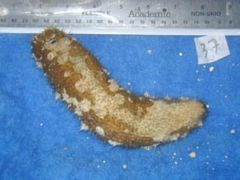Project 52: R. M. Clouse, D. A. Janies, A. M. Kerr. 2005. Resurrection of Bohadschia bivittata from B. marmorata (Holothuroidea: Holothuriidae) based on behavioral, morphological, and mitochondrial DNA evidence. Zoology. 108 (1):27-39.
Abstract
Behavior, color, body size, spicules, and mitochondrial DNA were examined in two morphs from the Bohadschia marmorata (Jaeger, 1833) species complex in Micronesia to test whether they are conspecific. This complex consists of eight morphs that have been described as separate species and combined in various ways for over a century. We examined the classic B. marmorata type and the type originally described as the species B. bivittata (Mitsukuri, 1912); B. bivittata was combined with B. marmorata by Panning (1944). Several observations and a phylogenetic analysis led us to conclude that B. marmorata and B. bivittata should return to their status as separate species. First, B. marmorata lives in shallow areas with strong currents, and B. bivittata lives on open sand between corals in deeper water. Second, the coloration of B. bivittata is distinct from B. marmorata, and although specimens collected on Yap Island differed from Mitsukuri's original description of B. bivittata, no specimens were collected with coloration intermediate between B. bivittata and B. marmorata. Third, spicules are more highly branched, perforated, and spiked in B. bivittata than in B. marmorata (and, in our study, spicule complexity did not correlate with body size). Finally, our phylogenetic analysis, based on partial nucleotide sequences of 16s, 12s, and COI mitochondrial genes, resulted in a tree(Pearsonothuria graeffei (Bohadschia marmorata) (B. argus (B. bivittata)))which shows that B. marmorata and B. bivittata are not even sister species, with B. bivittata more closely related to B. argus. Support for the clades for each Bohadschia species was strong, but the clade containing B. argus and B. bivittata had weaker support. Color and spicule examinations made of preserved B. marmorata-complex specimens from the Indo-Pacific as well as behavioral observations in the field also support the resurrection of B. bivittata.Read the article »
Project DOI: 10.7934/P52, http://dx.doi.org/10.7934/P52
| This project contains |
|---|
Download Project SDD File |
Currently Viewing:
MorphoBank Project 52
MorphoBank Project 52
- Creation Date:
01 June 2006 - Publication Date:
01 January 2007 - Media downloads: 1

Authors' Institutions ![]()
- Harvard University
- Ohio State University
- James Cook University
Members
| member name | taxa |
specimens |
media | media notes |
| Seth Kaufman Project Administrator | 0 | 0 | 0 | 0 |
| MorphoBank Curator Full membership | 0 | 0 | 0 | 0 |
| Daniel Janies Full membership | 0 | 0 | 0 | 0 |
Project has no matrices defined.
Project downloads 
| type | number of downloads | Individual items downloaded (where applicable) |
| Total downloads from project | 380 | |
| Document downloads | 1 | Copyright information for exemplar media (1 download); |
| Project downloads | 378 | |
| Media downloads | 1 | M1088 (1 download); |

